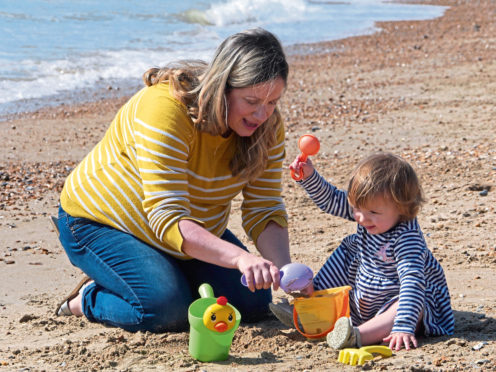
Childless single women in their late 30s and early 40s face the prospect of never becoming a mother – unless they embrace the challenge of solo parenting.
That’s exactly what journalist Genevieve Roberts did at the age of 37, when she found her fertility levels were dwindling. Without a partner, but desperate for children, she took the brave step of trying to get pregnant through a sperm donor.
Three years later and still single, she has an adored two-year-old daughter, Astrid, is expecting another baby, and has written a book, Going Solo (Piatkus, £13.99, available now) to share her experience of going it alone.
It’s an unusual parenting journey, as Genevieve explains.
“I was 37, single and found out I had low fertility. In my 20s and early 30s I’d always imagined I’d have children with a boyfriend, as a deliberate consequence of a loving relationship.
“But when I learnt my fertility was dwindling, I found the thought of not at least trying to become a parent heartbreaking. So, with no time to lose, I decided to do my best to become a parent – and then hopefully meet a partner later down the line.
“I spent a lot of time looking through a sperm bank website. My main criteria was health – there were details not just of the donor’s health but that of his relatives.
“I didn’t find one family that was entirely cancer free, but looked for those where most people lived long lives. It’s not the way I’d choose a partner but I felt it was a good approach.
“The donors filled in character descriptions, so I picked someone who was active, loved being outdoors and sounded like he had a huge passion for life.
“With my daughter, I was very lucky to find myself pregnant after the second round of intrauterine insemination (IUI) – despite my low fertility levels,” continues Genevieve.
“I’ve been so lucky with the help and love I’ve received from friends and family – this has ranged from practical support to enormous generosity.
“The emotional support I receive is invaluable. Friends and family listen to any concerns or decisions about Astrid; they share my excitement when she learns to do something new.
“This is the biggest decision I’ve ever made and I’m very lucky people have been so supportive.
“People understand families come in all shapes and sizes, but as long as children receive love and security then they have the basis to thrive.
“The baby I’m expecting now has the same donor,” adds Genevieve.
“I was encouraged to refer to him as a donor rather than a father when I talk about him to my children, because otherwise they could believe he’ll swoop in during adulthood as a dad figure.
“They’ll be able to contact him at 18 if they wish to, but that’s so they can understand their history, rather than establish a father-child relationship belatedly.”
What would she say has been the most difficult things about having children on her own?
“It would be wonderful if someone loved Astrid as much as I do.
“There are times when I’d love the emotional support – during the tough times when Astrid is unwell, then I’d love someone to tell me I’m doing OK and give me their opinion on when we should call medical help.
“Of course, not everyone with a partner can count on this support at the moments they want it.
“I have no regrets, and for every tough moment there are many more where I feel so lucky to have the chance to watch and help Astrid discover the world.
“I know the first years of being a parent can be hard, whether with a partner or not, but I’d happily experience this a million times to have such an amusing, wonderful daughter.”
Would Genevieve advise other childless women to try getting pregnant like she did?
“For some women, having children feels desperately important, others are fulfilled without children.
“What I’d like women who do want children to know is that in their 30s they need not feel the pressure to swiftly find someone – anyone – to have children with because time’s running out.
“For me, having children is the very best thing I’ve done in my life, but I think everyone has to make the right choice for them.
“I want the world for my daughter and so there’s a sadness that she doesn’t have a dad. It’s very important to me that she has male role models in her life who she knows she can always turn to.
“I emphasise to her how loved she is, not only by me but by her relatives. I will always encourage her to ask questions about the donor and share her feelings about not having a dad.
“On one level, Going Solo is a love letter to my daughter. I hope if she reads it when she’s grown up, she’ll feel the love for her on every page.
“Secondly, I want people to know they always have a choice. It’s good for everyone to know more about different types of family which don’t follow the conventional form but are brimming with love.”

Enjoy the convenience of having The Sunday Post delivered as a digital ePaper straight to your smartphone, tablet or computer.
Subscribe for only £5.49 a month and enjoy all the benefits of the printed paper as a digital replica.
Subscribe